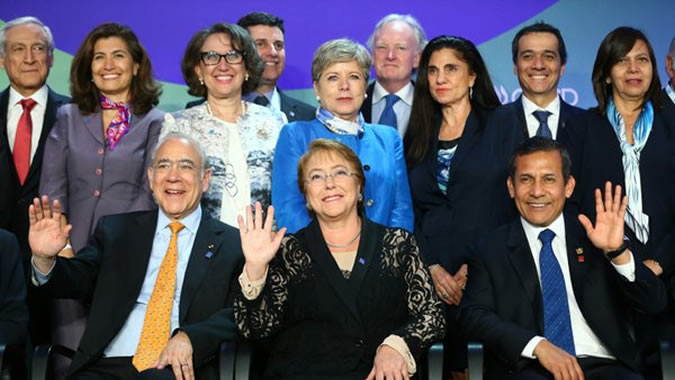ECLAC Highlights at OECD Forum Importance of the 2030 Agenda for Integration and the Change Towards a New Development Pattern
Work area(s)
The organization’s Executive Secretary, Alicia Bárcena, emphasized in Paris the similarities between both institutions for supporting country implementation of this agenda.

The Executive Secretary of the Economic Commission for Latin America and the Caribbean (ECLAC), Alicia Bárcena, reaffirmed this week in Paris that the 2030 Agenda for Sustainable Development is a unique opportunity to change the development pattern and move towards more productive societies focused on people’s well-being.
Bárcena is participating in the Organisation for Economic Co-operation and Development (OECD) Week 2016 and in the International Economic Forum on Latin America and the Caribbean 2016, which are being held in the French capital from May 31 through June 3. The senior United Nations official was a panelist on Wednesday, June 1 in the OECD Forum 2016, the motto of which is “Productive economies, inclusive societies,” and she participated on Thursday, June 2 in the high-level meeting of the Governing Board of the OECD Development Centre.
Other prominent figures who attended the OECD Forum 2016 included heads of State such as Chilean President Michelle Bachelet and Peruvian President Ollanta Humala, as well as senior authorities from France and various Latin American countries. At the event the OECD’s program for the region was presented.
During the OECD Forum 2016’s panel on productivity, inclusive growth and governance in Latin America, ECLAC’s Executive Secretary insisted on the importance of the 2030 Agenda for productive integration, which is one of the drivers of the region’s economy and a fundamental tool for advancing towards inclusive growth. She also indicated that equality must be at the center of countries’ development strategies and to achieve that, it is necessary to take the path of progressive structural change and use Politics as an instrument.
“We are living through a profound change of era. The current development model is not sustainable. If the world is to come out of the recessive bias it is experiencing, collective and coordinated action among economies is needed to reactivate growth,” Bárcena said.
The official also explained that there is an imbalance between the financial sector and the real sector, since even though there is plenty of liquidity in markets (given that financial assets are 10 times greater than global GDP) the resources are not in good hands.
In this sense, Bárcena said that programs such as the one that fights against Base Erosion and Profit Shifting (BEPS), implemented by the OECD, are very interesting. “Currently in Latin America evasion accounts for $320 billion dollars a year. With that we could finance the 2030 Agenda,” she said.
“Inequality is a risk that conspires against democracy. We must move ourselves from a culture of privilege to a culture of equality. The conversation has to change with the private sector and the social sector,” said Bárcena, who invited all the participants to work on the 2030 Agenda.
Meanwhile, in her presentation before the Governing Board of the OECD Development Centre on Thursday, June 2, Bárcena emphasized the similarities between the work of ECLAC and the OECD to give support to countries in the implementation of the 2030 Agenda’s goals.
“For years ECLAC has addressed the region’s problems with a comprehensive view of development. This has been demonstrated in our latest institutional documents presented to member countries during the Commission’s biennial meetings (which make up the trilogy of equality), and in the most recent of these, Horizons 2030: Equality at the Centre of Sustainable Development, which we just released in Mexico during the thirty-sixth session,” she indicated.
“The Multidimensional Country Reviews (MDCRs) of the OECD represent instruments to move towards the correct path for an integrated vision of development, and they are aligned with the implementation of the 2030 Agenda and its 17 Sustainable Development Goals (SDGs),” Bárcena said.
ECLAC’s Executive Secretary stressed that the 2030 Agenda presents multiple challenges in terms of implementation, including the construction of a global governance to close financial and technological asymmetries among countries as well as the forging of collective action for global public goods: stable growth with full employment that at the same time preserves the environment.
“The four fundamental and inspirational core focuses of this work are equality, progressive structural change, the relationship between current conditions and structures, and a new equation between the State, the market and society,” she said.
On Friday, June 3, Alicia Bárcena will be one of the main speakers at the International Economic Forum on Latin America and the Caribbean 2016. On that occasion, she will participate in the event’s closing speech, along with French Minister of Foreign Trade and Tourism, Matthias Fekl.
Related content
Country(ies)
- France
- Latin America and the Caribbean
Related link(s)
Contact
Public Information Unit
- prensa@cepal.org
- (56 2) 2210 2040